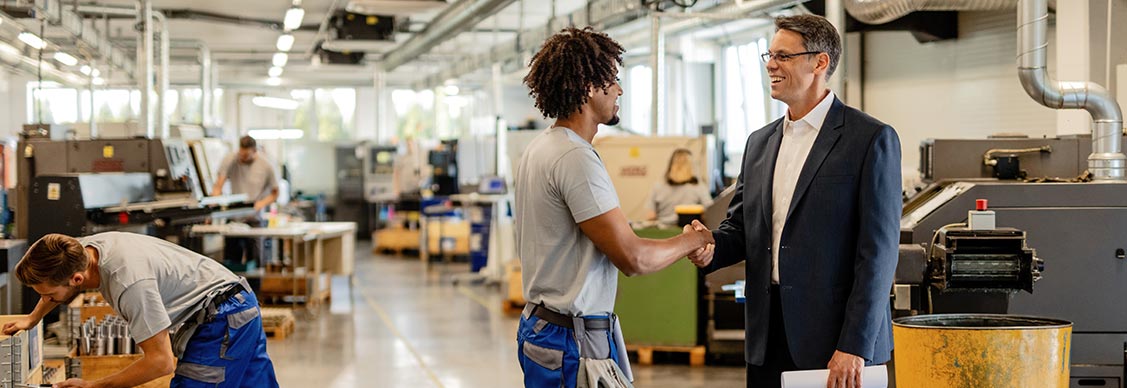How companies are partnering with suppliers to deliver social impact
Firms are adopting responsible business practices that go beyond regulatory compliance
Today’s supply chains need to be more than efficient and reliable. Increasingly, they must meet a growing range of environmental and social targets – and the pressure is on companies to show that they do.
An estimated 70% of a large organization’s sustainability impact comes from its supply chain and Scope 3 emissions are on average 5.5 times higher than a company’s direct emissions, according to CDP.
Meanwhile, growing societal focus on gender, social, and racial injustice, plus legislation including modern slavery acts and EU guidance on forced labor, have increased the focus on the governance required to manage the huge network of service suppliers attached to buildings.
It means firms are starting to take a closer interest in the operations of those they do business with, says Hannah Dwyer, EMEA Head of Work Dynamics Research.
JLL’s Social Value research shows that one in two organizations are already engaged in responsible procurement practices. Furthermore, 62% say they now have a social value strategy that addresses responsible procurement.
The UN defines sustainable procurement as making sure that products and services bought are as sustainable as possible, with the lowest environmental impact and the most positive social results.
“A significant proportion of JLL’s spend is managed with our supply partners,” says Janette McCormick, JLL’s Global Head of Product Sourcing & Category Management. “Taking an intentional and responsible approach demonstrates our corporate commitments – but it also makes good business sense.”
Employees are voting with their feet by choosing to work for companies that align with their own values, while customers increasingly seek ethical businesses who demonstrate strong social purpose.
“Embracing social value expectations offers competitive advantage. Companies who ignore changing stakeholder attitudes risk missing out on talent and valuable business,” explains Dwyer.
As well as ensuring suppliers are aligned on purpose, firms seeking to make a real difference are increasing business opportunities for social enterprises and smaller businesses from a diverse range of backgrounds whether through ethnicity, gender, sexual orientation, disability or veteran status.
JLL’s research found 48% of respondents already partner with local suppliers to create positive community benefits and 36% currently track and report their supply chain/third parties’ impact on social value.
Spending with intent
With large global organizations managing procurement budgets of billions of dollars, the impact of creating a more socially balanced supply chain landscape is significant.
“There’s an opportunity to generate lasting benefit, by building relationships with small and diverse businesses from historically under-represented groups,” says McCormick.
In England alone there were 5.2 million microbusinesses with less than 10 employees in 2022. However, failure is common – due to lack of support and high initial costs.
One company aiming to make a difference, is global office supplies firm, Lyreco. They use their Lyreco Goodness Microbusiness Support Programme to back ambitious small firms who align with their sustainability criteria, providing expert advice, access to markets and faster payment terms.
“It’s vital that small independents have access to working capital,” explains McCormick. “Offering shorter payment terms helped one of our female-owned suppliers, grow her business by 10%. Now she can pay her team on time, employ them for more days each month and hire new contractors.”
With larger suppliers, there’s potential to create wider impact on communities by committing to upskilling initiatives such as apprenticeship programs and language training.
Leading by example
Partnering with advocacy groups such as the National Minority Supplier Development Council in the US, the European LGBTIQ Chamber of Commerce, and Supply Nation in Australia, is another way that more mature companies can support a diverse range of firms along their own ESG journeys.
McCormick describes how participating in external events - such as those organized by WEConnect International who champion women-owned businesses - or organizing supplier engagement sessions, helps share best practice and creates space for conversations that drive the sustainability agenda forward. “It can even be as simple as explaining how to navigate online portals to complete the necessary onboarding paperwork or compliance reporting,” she adds.
It’s just part of the way that the built environment is increasingly acting as a vehicle for investors and organizations to maximize their return on sustainability efforts, according to Dwyer.
Take an Australian financial services client, guided by circular economy principles and social engagement goals. They procured sustainable materials from indigenous-owned businesses and employed local people with disabilities to assemble modular panels for their retail units.
“It shows how social and environmental goals can be addressed in tandem, while using the procurement process as a force for good,” says Dwyer. Some 54% of companies say they’re now considering responsible sourcing when designing and operating their facilities.
Across real estate, the wider ecosystem of stakeholders including occupiers, investors and local authorities, are waking up to the idea of partnerships, as a way to accelerate shared social goals.
“Firms are now expected to show proof of progress towards their corporate commitments – but they can’t get there on their own,” says Dwyer. “Driving material change requires strategically partnering with the supply chain, helping all businesses act responsibly to deliver long term sustainable results.”
